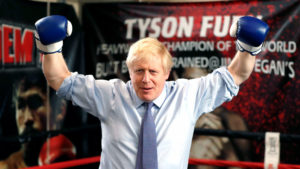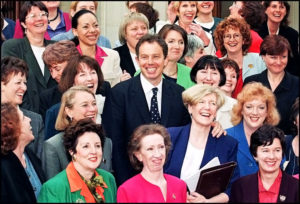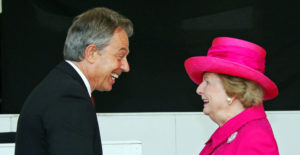Fifteen years after he stood down as Prime Minister, 25 after he was elected, Blair still deserves to be listened to. The three Labour leaders after him — Gordon Brown, Ed Miliband, and Jeremy Corbyn — defined themselves against Tony, and they all lost. Keir Starmer wants to build on Blair’s legacy, uses much of Tony’s language and many of his tactics — and he has been in the lead for the last 100 opinion polls. Point made, surely.
What was it about the final years of Blair’s premiership that ensured his political legacy? There’s the obvious point that when he became PM it was his first and only job in government and he had energy but no experience. By the time he left, he knew exactly how to get things done but was running out of road.
I was Blair’s Political Secretary between 2005 and 2007 and had a front row seat for the end of the “Blair Years”. They were rugged times. There were new opponents on the benches opposite with the election of David Cameron as Tory leader. And there were old enemies on manoeuvre on the Labour benches, as Brown’s attempts to dislodge Tony became increasingly obvious and frantic. Remember the rolling resignations of the Parliamentary Private Secretaries — Khalid Mahmood, Wayne David, Ian Lucas, Mark Tami, David Wright and Chris Mole? Probably not, but it was the “How many letters have been submitted?” moment of its day.
Eventually, Labour MPs were ground down by the relentless friendly-fire attacks and Blair stood down as PM in May 2007, a year earlier than he had planned. Yet he never became bitter. I remember a meeting in the Den, the PM’s room between the private office and the Cabinet Room, when a colleague exasperatedly said: “But Gordon just wants to be Prime Minister!” After a moment’s reflection, Tony replied: “It’s not an ignoble ambition.” Thoughtful and scrupulous.
The Labour Party’s internal wrangling was an opportunity Cameron seized. He repeatedly found ways to create alliances with Labour rebels to oppose government policy — the core was the awkward squad which included Corbyn who voted with the Tories numerous times. But the number of rebels was growing. It is an iron law of politics that ministers who serve loyally when in the government suddenly find their consciences when they return to the backbench in a reshuffle. Where once they had demanded the whips push through their policies, they now found their personal and political integrity required them to question — and often oppose — government legislation.
By the third term, there had been many reshuffles and the number of former ministers outweighed our majority. In response to this, I ran a small group we called the “Non-embittered Former Ministers”. We also added Keith Hill as the Prime Minister’s PPS. A former union official, he added reach to our political networks among MPs, and every week allocated the precious hour after Prime Minister’s Questions when backbenchers got to meet with the PM to raise concerns, float policy ideas or introduce guests. On one memorable occasion, I brought Shakira in to meet the Prime Minister — she was in Westminster for a parliamentary event. Tony started to explain that he knew her music and admired the way it combined Colombian music traditions with modern American pop music. “Ah”, replied Shakira — silencing us all. “So you think I am some kind of allegory of globalisation?”
But it wasn’t all about party management. There was the pressure, too, of external inquiries. This was the first time the Metropolitan Police had ever investigated Number 10 — a complaint from an SNP backbencher that should have been dismissed immediately as party politics led instead to the “cash for honours” probe. In the absence of any evidence, the Met spent 18 months trying, and failing to find any. The PM’s behaviour was respectful: he let it be known that being interviewed under caution would be a resigning matter — a contrast with the attitude of the current Prime Minister. And he unreservedly backed the few of us, including myself, who were questioned by the police. His confidence that it would come to nothing was morale-boosting during a deeply stressful period.
In the end, third terms should be critical for legacy. Margaret Thatcher’s third term, despite the disaster of the “poll tax”, embedded and made irreversible many of her changes. The task New Labour set itself was to leave most of the Tory reforms, but to rebalance some and to rebuild the public square which had been brutally neglected. So, mass picketing and car park show of hands strike ballots were left outlawed, but workers rights were extended, in particular with maternity rights and the statutory right to bank holidays on top of annual leave. The “right to buy” your council home was maintained, but two million social homes were renovated to Decent Homes standards. Choice in health and education was built on, and extended, while waiting lists were slashed — with a now nearly unimaginable guarantee of an 18-week wait for routine treatment.
In turn, most of Blair’s reforms became irreversible. The National Insurance increase to fund the NHS was kept, and has been mimicked by Boris Johnson’s government. Health performance has been hampered by persistent underfunding, the pandemic, and the ill-fated Lansley reforms which are now being abandoned — but the NHS was kept on the road by appointing former Blair adviser Sir Simon Stevens as Chief Executive of NHS England.
There were also significant moments. The G8 meeting in Gleneagles in 2008 deciding to make poverty history by wiping out the debt of heavily indebted countries in the Global South. London winning the bid for the 2012 Olympics. And the tragedy of the 7/7 bombings which drew great compassion and leadership from Blair.
Of course, Blair’s leadership ended in resignation, and New Labour’s third term ended in defeat for Brown. Unfortunately, for a decade party members took the quixotic view that the only reason voters elected increasingly Right-wing Tory governments was that Labour was insufficiently Left-wing. And under Miliband and Corbyn the party moved further and further away from the centre and further and further towards destruction.
Blair didn’t despair. He made the argument about how Labour could win again. And he has consistently continued to make critical policy interventions — such as driving the argument on vaccination rollout. This strategic patience has paid off. The true legacy of the 2005-2007 Blair government is finally becoming clear. Labour’s desire to win is back. Policy ideas are unashamedly Blairite. And Starmer’s mantra “Opportunity, Security, Respect” could come straight from a Tony Blair conference speech.
History will be the ultimate judge of Tony’s reputation. It will weigh the Iraq war against the Good Friday Agreement which ended the war in Northern Ireland. For Labour Party members and activists it has thankfully settled into the realisation that Labour’s electoral record in the last eleven elections is: Lose, Lose, Lose, Lose, Win, Win, Win, Lose, Lose, Lose, Lose. And the only way to win is to build on Tony Blair’s record rather than spurn it.
Disclaimer
Some of the posts we share are controversial and we do not necessarily agree with them in the whole extend. Sometimes we agree with the content or part of it but we do not agree with the narration or language. Nevertheless we find them somehow interesting, valuable and/or informative or we share them, because we strongly believe in freedom of speech, free press and journalism. We strongly encourage you to have a critical approach to all the content, do your own research and analysis to build your own opinion.
We would be glad to have your feedback.
Source: UnHerd Read the original article here: https://unherd.com




